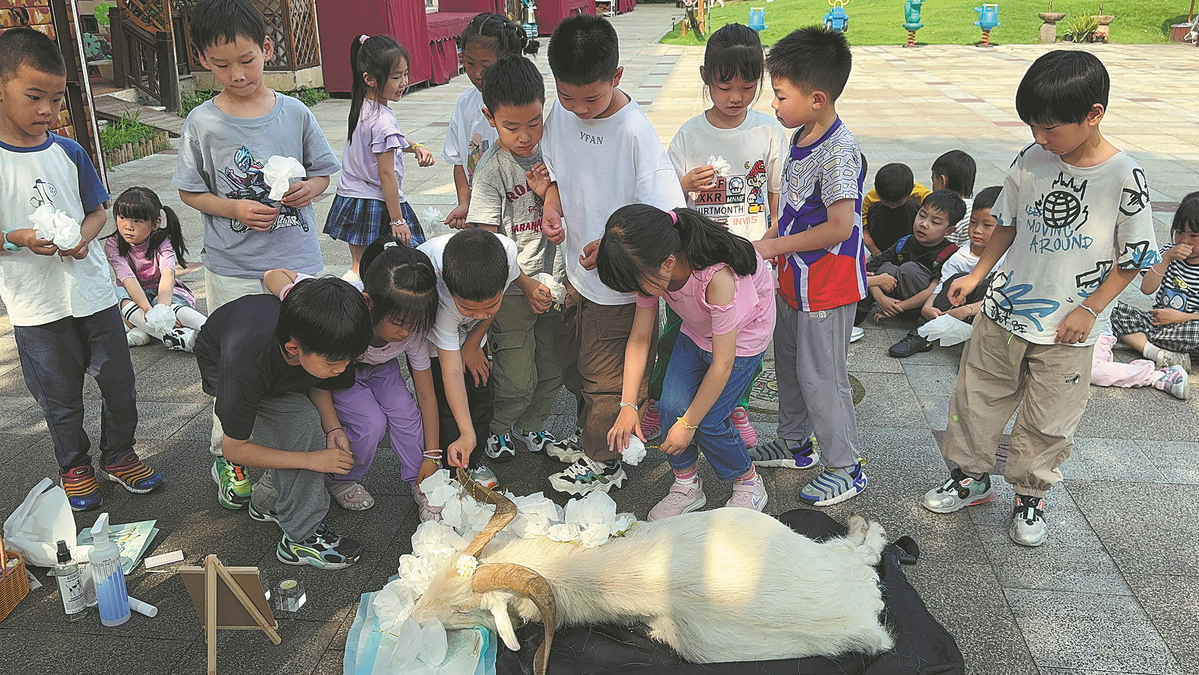Death of a beloved pet gives kids a life lesson
Death of a beloved pet gives kids a life lesson
By Chen Ye and Chen Meiling | China Daily |

During a special farewell ceremony late last month at Shenhualu Kindergarten in Hangzhou, Zhejiang province, a group of children surrounded Ding Ding, their 14-year-old pet goat that had recently died.
The children said their final goodbyes while offering white napkin flowers to their furry friend.
Some children said: "I will remember you forever." Others said: "I love you, Ding Ding!"
After learning they would never see Ding Ding again, most burst into tears. "Death is a part of our life. It's important for children to experience this process, understanding that life has an end," said Bao Huilan, the life education course teacher at the kindergarten.
From 2010 — when Ding Ding arrived at the school as a kid — until his death, about 1,800 children took turns caring for him, performing tasks such as feeding him, designing nutritious recipes, decorating his pen and monitoring his health.
Bao said the children were very observant and learned critical thinking through their interactions with the goat. For instance, during the feeding process, some questioned if giving the goat too much food would cause it to have a stomachache. This led them to ponder how much food a goat needs to eat daily.
An experienced parent told them that a goat eats about 8 percent of its body weight in food per day. With the help of a security guard, the children used carrots to lure Ding Ding onto a scale and discovered he weighed approximately 40 kilograms.
The older children then designed a nutrition plan for Ding Ding and began feeding him vegetables, carrots and grass two to three times a day. They even prepared food for the goat on the weekends and asked the security guards to feed him. "They had it all planned out," Bao said.
Ding Ding's pen was decorated with flowers and ribbons that were handmade by the children. Zhou Yijing said her 6-year-old daughter Dou Dou was very passionate about this task, often asking if they had extra ribbons at home.
Every Spring Festival, the children would renovate Ding Ding's pen. His story was adapted into a play that the children performed at their graduation ceremonies.
Although the average life span of a goat is 12-15 years, the children believed that with good care, he could live up to 18 years.
However, on the morning of June 17, a security guard reported that Ding Ding hadn't eaten for two days and refused to leave his pen. Upon hearing this, the children rushed to the pen, calling out to Ding Ding and trying to coax him out with food, but the goat remained inside. The teachers then led the children back to their classroom.
Bao organized a discussion about why the goat wouldn't come out. The children guessed that he might be sick, and he didn't want his illness to spread to them. They also realized he was actually quite old, equivalent to a human in their 70s or 80s.
At around noon, while the children were napping, Ding Ding stopped breathing. Bao gave them the news in a euphemistic way. "The children looked very sad and expressed many other complex emotions," she said. "Ding Ding was not only their friend, but also an important, beloved one."
Chai Hao, the kindergarten's director, contacted a pet funeral service company to deal with the goat's remains and organized a special farewell ceremony.
The funeral company's employees invited Chai to cut off some of Ding Ding's hair as a keepsake and assured the children that he would visit them in spirit. She said the children were inconsolable and continued to cry even after they reached home, according to their parents.
"We tried to comfort them, but words had little effect because they were so emotional," the director said.
Chen Leji shared a conversation she had with her daughter, one of the kindergartners, about Ding Ding's death on her WeChat Moments.
Chen explained that Ding Ding had gone to another world after enjoying a happy life, during which he was well cared for. Her daughter lamented that she would never see the goat again, and Chen reassured her that, although he wouldn't return, the memory of him would live on in her heart, just as the daughter's great-grandmother does. "Birth, aging, sickness and death are things that everyone must face, and they are also natural," Chen told the girl.
Bao said she believed the whole process, from the children caring for Ding Ding to participating in his farewell ceremony, could serve as a positive lesson for them.
Chai wrote a heartfelt obituary titled "A Letter to Passersby", which she posted outside the kindergarten. Her warm words attracted the attention of many people who stopped to read it. The letter not only announced Ding Ding's death but also recalled fond memories of the interactions between the goat and the community. In the letter, she thanked everyone for their kindness and support, emphasizing that though Ding Ding was gone, the goat would live on in the memories of the children and the community.
The kindergarten is located next to a road frequently used by commuters, who would often stop to look at the goat in his pen.
"Ding Ding was accepted as part of the community. This atmosphere of love and harmony was why I wrote the letter, to thank these caring people," she added.
The letter, together with the story of Ding Ding and the children, later spread through social media, touching many hearts.
"Here once lived a goat. After 14 rounds of spring, summer, autumn and winter accompanying children generation after generation, he finally went to heaven with all our wishes. He left quietly after a happy and lucky life," the letter wrote.